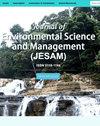Ideal Versus Reality: Questioning the Inclusivity of Climate Change Policy Innovation Process in the Turkish Context
IF 0.3
4区 环境科学与生态学
Q4 ENVIRONMENTAL SCIENCES
引用次数: 0
Abstract
This research aims to reveal the extent on how governance culture is embedded in climate policy innovation processes in the Turkish context. In Turkey, the process deal with multilateral climate policies started in 2004, when the country announced to be a party of United Nations Framework Convention on Climate Change (UNFCCC). However, climate policies started to be developed in the 1990s, when the importance of governance began to gain considerable recognition. It is now possible to discuss to what extent governance-based approach has been followed in the processes of climate policy innovation until 2016, since it has been a quarter century from when the time both climate policies and governance began to take place on the public agenda in Turkey. In order to achieve its aim, the study focuses on the extent all related stakeholder groups participation in policy innovation processes in the case of the Coordination Board of Climate Change and Air Management (CBCCAM) through document analysis technique. The research reveals that governance culture has not been embedded in climate policy innovation processes in Turkish context. This study could help to provide a critical view of the embeddedness of governance culture in climate policy innovation processes through focusing on CBCCAM in Turkey.理想与现实:质疑土耳其背景下气候变化政策创新过程的包容性
本研究旨在揭示土耳其背景下治理文化如何嵌入气候政策创新过程的程度。在土耳其,处理多边气候政策的进程始于2004年,当时该国宣布成为《联合国气候变化框架公约》(UNFCCC)的缔约国。然而,气候政策是在20世纪90年代开始制定的,当时治理的重要性开始得到相当大的认可。现在可以讨论在2016年之前,在气候政策创新过程中,基于治理的方法在多大程度上得到了遵循,因为从土耳其开始将气候政策和治理列入公共议程已经过去了四分之一个世纪。为了实现其目标,本研究通过文件分析技术,重点关注气候变化和空气管理协调委员会(CBCCAM)中所有相关利益攸关方群体参与政策创新过程的程度。研究表明,在土耳其背景下,治理文化尚未融入气候政策创新过程。本研究通过关注土耳其的CBCCAM,有助于对治理文化在气候政策创新过程中的嵌入性提供一个批判性的观点。
本文章由计算机程序翻译,如有差异,请以英文原文为准。
求助全文
约1分钟内获得全文
求助全文
来源期刊

Journal of Environmental Science and Management
ENVIRONMENTAL SCIENCES-
CiteScore
0.90
自引率
0.00%
发文量
10
审稿时长
2 months
期刊介绍:
The Journal of Environmental Science and Management (JESAM) is an international scientific journal produced semi-annually by the University of the Philippines Los Baños (UPLB).
JESAM gives particular premium to manuscript submissions that employ integrated methods resulting to analyses that provide new insights in environmental science, particularly in the areas of:
environmental planning and management;
protected areas development, planning, and management;
community-based resources management;
environmental chemistry and toxicology;
environmental restoration;
social theory and environment; and
environmental security and management.
 求助内容:
求助内容: 应助结果提醒方式:
应助结果提醒方式:


